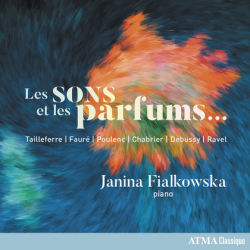Janina Fialkowska has made a delightful new recording of French piano music titled “Les sons et les parfums…”
You might know that phrase from Baudelaire’s Fleurs du mal, in a wonderfully evocative poem “Harmonie du soir”, where music is as fundamental to the evening as a sunset or the air we breathe. Recalling Walter Pater’s famous saying that “all art aspires to the condition of music”, this poem is practically a sermon, both an invitation & an exhortation. Of course it’s an uncommon title for an album, perhaps an indication that this is a change of direction for Fialkowska, who I know mostly as an interpreter of Chopin, Liszt, and eastern Europeans with some ventures into German rep.

But I couldn’t help noticing how the opening cut sounded like something Chopin would have written, an easy-going Impromptu by Tailleferre that put me in mind of Chopin’s A-flat Impromptu, with its flowing lyricism. Did Fialkowska mean to open as though making a segue from Chopin into the French rep? Or maybe it’s all in my mind. But of course Chopin himself is a perfect bridge, an exile from Poland who was after all half French. Tailleferre’s easy & melodic textures open the doorway in the gentlest way for what’s to come.
But the liner notes suggest that this is if anything a sentimental journey for the pianist, familiar rep from the past that she has played many times in the past. Perhaps it’s who she has always been even if the French pieces can’t be found in her discography.
Better late than never..!
It’s a fascinating and well-conceived survey that brings us into the 20th century from the final decades of the 19th.
- Impromptu by Germaine Tailleferre
- Nocturne #4 by Gabriel Fauré
- Intermezzo by Francis Poulenc
- Habanera by Emmanuel Chabrier
- Poissons d’or by Claude Debussy
- Les sons et les parfums tournent dans l’air du soir by Claude Debussy
- Reflets dans l’eau by Claude Debussy
- Clair de lune by Claude Debussy
- Jeux d’eau by Maurice Ravel
- Sonatine by Maurice Ravel
If these works are not well-known to you, the album will persuade you of their importance, very easy to listen to. There’s variety even though they hang together like a well-curated exhibit of art by several painters.
Fialkowska’s sound is very clear, mostly sparing in the use of the pedal, without any noticeable blur even when many notes are being sounded, as transparent & sparkling as a clean aquarium full of koi. For the most part this sounds very relaxed, without the kind of drama one associates with virtuoso display. We’re hearing a pianist who is so self-assured that she gets inside the music. The water pieces by Ravel & Debussy have lots of atmospheric effects, decisively coloured and yet ultimately very calm & tranquil. This is pianism of the highest order without struggle or conflict.
I will resist the temptation to use the “I” word that is so often used when speaking of Ravel & Debussy, a descriptor imported from the realm of painting. I don’t use the word because I believe it’s misapplied when speaking of Debussy, and likely as well with Ravel. These evocative compositions conjure visual images of water & fish & moonlight in Fialkowska’s interpretations. If you find it helpful to think of the painterly qualities of music in this period, especially if it reminds you of the colours & effects found in paintings by Renoir or Monet, then by all means, seize the association. However you choose to understand the music, you’ll hear confident and accurate playing inviting you to an encounter of warmth and tenderness.
Pingback: Imagining the unimaginable or why we need a #GlobalClimateStrike | barczablog